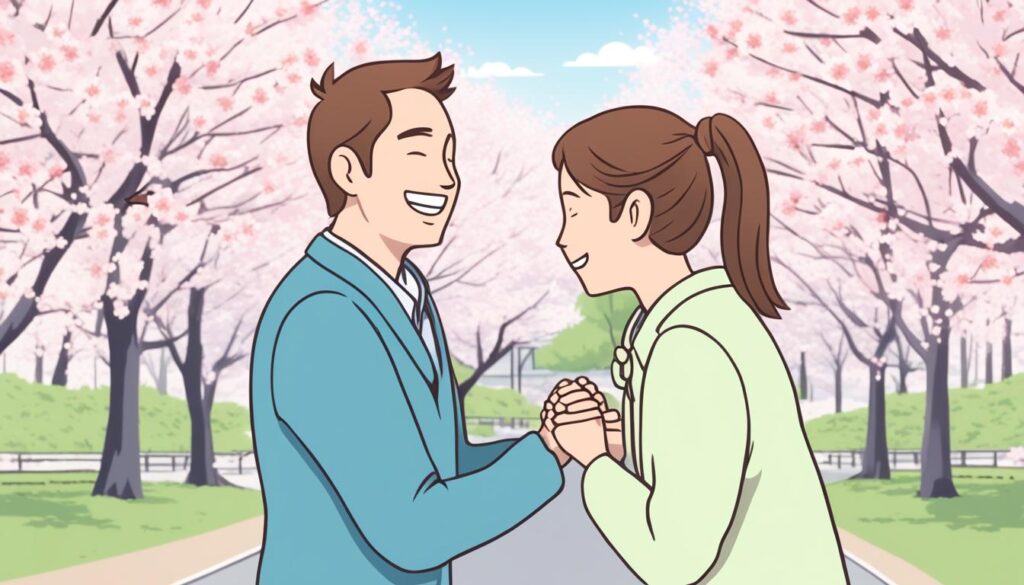Welcome to our guide on how to say “morning” in Japanese! Understanding proper greetings is crucial for effective communication and cultural understanding. In this article, we will explore the various ways to greet someone in Japanese and the correct usage of morning greetings.
Whether you’re planning a trip to Japan or simply interested in the Japanese language and culture, learning how to say “morning” in Japanese is a great starting point. So let’s dive in and discover the different expressions used to greet someone in the morning in Japan.
But first, let’s have a quick glimpse of how important it is to greet correctly in Japanese culture. In Japan, greetings are considered essential for maintaining harmonious relationships and showing respect to others. The way you greet someone can vary depending on the time of day and the relationship you have with the person you are greeting.
Now, let’s explore the meaning, grammar, pronunciation, and cultural nuances associated with morning greetings in Japanese. By the end of this article, you’ll be equipped with the knowledge to confidently greet someone and say “morning” in Japanese.
Next, we’ll delve into the meaning and grammar behind morning greetings in Japanese.
Common Japanese Greetings and How to Use Them
In Japanese culture, greetings play a significant role in social interactions. The appropriate use of greetings reflects respect, courtesy, and a deep understanding of Japanese customs. Let’s explore the most common Japanese greetings and discover how to use them effectively in different situations.
1. Konnichiwa – This is a versatile greeting that can be used throughout the day to greet someone with “hello” or “good afternoon.” It is suitable for both formal and informal settings.
2. Ohayou gozaimasu – This greeting is specifically used to say “good morning.” It is a formal way of greeting someone in the morning and is usually used until around 10:00 a.m.
3. Konbanwa – When evening approaches, it is customary to use this greeting to wish someone “good evening.” This polite greeting is acceptable in both formal and informal settings.
4. Oyasumi nasai – Before bidding someone goodnight, the phrase “oyasumi nasai” is used. It is a polite way of showing respect and is commonly used in formal and informal settings.
5. Arigatou gozaimasu – To express gratitude, the phrase “arigatou gozaimasu” is used, which translates to “thank you very much.” It is suitable for both formal and informal occasions.
6. Sumimasen – When seeking assistance, apologizing, or getting someone’s attention, the word “sumimasen” is used. It can be interpreted as “excuse me” or “I’m sorry.”
Understanding the appropriate usage of these greetings is crucial in Japanese culture. Here is a table summarizing different situations and their corresponding greetings:
| Situation | Greeting |
|---|---|
| Meeting someone for the first time | Hajimemashite |
| Greeting friends or colleagues | Konnichiwa |
| Addressing superiors or elders | Ohayou gozaimasu (morning) or Konnichiwa (afternoon/evening) |
| Expressing gratitude | Arigatou gozaimasu |
Remember that using the appropriate greeting in different situations demonstrates your understanding and respect for Japanese culture. By incorporating these common Japanese greetings into your conversations, you can enhance your interactions and build stronger connections.
How to Say Good Morning in Japanese
When it comes to greetings in Japanese, saying “good morning” holds significant importance. In Japanese culture, there are both formal and casual ways to greet someone in the morning. Let’s explore the two commonly used phrases: “ohayou” and “ohayou gozaimasu.”
Formal Greeting: Ohayou Gozaimasu (おはようございます)
In formal settings, such as in the workplace or when speaking to someone older or with higher status, it is appropriate to use the phrase “ohayou gozaimasu.” This phrase demonstrates politeness and respect.
Pronunciation: oh-ha-yo go-zai-ma-su
Casual Greeting: Ohayou (おはよう)
In more casual situations, like greeting friends or family members, the term “ohayou” is commonly used. This version of “good morning” is less formal and suitable when speaking to close acquaintances or peers.
Pronunciation: oh-ha-yo
It’s important to note that in Japanese culture, the level of politeness shown in greetings can vary based on the relationship between the individuals and the context of the situation.
| Formality | Phrase | Pronunciation |
|---|---|---|
| Formal | Ohayou gozaimasu | oh-ha-yo go-zai-ma-su |
| Casual | Ohayou | oh-ha-yo |
Other Time-Specific Greetings in Japanese
Apart from morning greetings, the Japanese language has specific greetings for different times of the day. It is important to know how to greet someone appropriately based on the time of day in Japanese culture. Here are some common time-specific greetings:
Good Afternoon
In Japanese, the phrase for “good afternoon” is “Konnichiwa”. It is used to greet someone during the afternoon hours, typically from 12:00 PM to 6:00 PM. The word “konnichiwa” is pronounced as “koh-nee-chee-wah”. It is a polite and commonly used greeting in Japan.
Good Evening
When it comes to greeting someone in the evening, you can say “Konbanwa” in Japanese. This phrase is used to say “good evening” from around 6:00 PM onwards. The pronunciation of “konbanwa” is “kohn-bahn-wah”. It is a polite and respectful way to greet someone in the evening.
Good Night
Before parting ways for the night, you can say “Oyasumi nasai” in Japanese, which means “good night”. This phrase is used to wish someone a restful night’s sleep. The pronunciation of “oyasumi nasai” is “oh-yah-soo-mee nah-sah-ee”. It is a polite and formal way to bid someone good night in Japanese.
Remember to use these greetings appropriately based on the time of day and the relationship with the person you are greeting. Now, let’s take a look at a visual representation of the time-specific greetings in Japanese:
| Time of Day | Greeting |
|---|---|
| Morning | Ohayou gozaimasu |
| Afternoon | Konnichiwa |
| Evening | Konbanwa |
| Night | Oyasumi nasai |
Now that you’re familiar with the time-specific greetings in Japanese, you can confidently greet someone and show respect for Japanese culture and customs.
Informal Greetings in Japanese

In addition to formal greetings, it’s essential to know how to greet your friends and peers in Japanese. Informal greetings allow you to establish a more casual and friendly tone in your conversations. Here are a few commonly used casual Japanese greetings:
| Greeting | Pronunciation | Meaning |
|---|---|---|
| “Yo” | yoh | Hey, hi |
| “Oi” | oh-ee | Hey, oi |
| “Yaa” | yah | Hey, yo |
These informal greetings are commonly used among young people and friends in Japan. They convey a sense of familiarity and informality, creating a more relaxed atmosphere in your conversations. Remember to use them appropriately depending on your relationship with the person you’re greeting.
Now that you’ve learned some informal Japanese greetings, you can confidently greet your friends and peers in a more casual manner. Practice these greetings to make your conversations feel more natural and friendly!
Unique Greetings in Japanese Culture
Japanese culture has a fascinating array of unique greetings that are used in specific situations and to uphold cultural norms. These greetings reflect the polite and respectful nature of Japanese society, and knowing when and how to use them can greatly enhance your cultural understanding and communication skills.
One such greeting is irasshaimase, which is commonly heard when entering stores in Japan. This traditional expression is used by store employees to welcome customers and make them feel valued and appreciated. The warm and enthusiastic tone of irasshaimase creates a welcoming atmosphere and sets the stage for a positive shopping experience.
Another important greeting is tadaima, which is used when announcing one’s return home. When you say tadaima upon entering your home, it signifies that you have arrived safely and are ready to be welcomed back. This simple yet meaningful greeting acknowledges the deep sense of connection and care between family members in Japanese households.
When visiting someone’s home in Japan, it is customary to say ojamashimasu as a way to express your gratitude and respect for being invited. This greeting conveys your understanding that you are entering someone else’s personal space and shows your appreciation for their hospitality. It sets a tone of consideration and politeness, ensuring that you are mindful of the host’s home and their generosity in inviting you.
In formal business settings, a common greeting is osewa ni natteorimasu, which is used to express gratitude for the ongoing support and collaboration between individuals or companies. This phrase reflects the importance of mutual respect and the value placed on relationships in Japanese business culture. It signifies that you appreciate the opportunity to work together and recognize the impact of the other person’s efforts on your own success.
Lastly, when greeting someone you haven’t seen in a while, you can use the expression ohisashiburi desu. This phrase is a polite way of expressing that it has been a long time since you last met or communicated with the person. Ohisashiburi desu demonstrates your consideration for the other person’s feelings and emphasizes the value you place on the relationship.
These unique greetings illustrate the intricate nuances and deep cultural roots of Japanese society. By familiarizing yourself with these expressions and learning when and how to use them appropriately, you can show your respect for Japanese culture and create meaningful connections with others.

